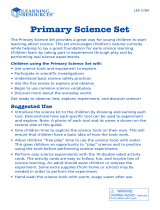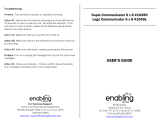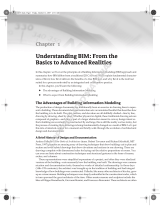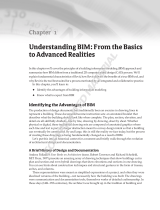
4000004_BI.indd 1 09/03/2012 5:51 PM

2
4000004_BI.indd 2 09/03/2012 11:03 AM

IN THE BOX YOU WILL FIND:
A bag of LEGO
®
Bricks and a
booklet describing:
An introduction to
Systematic Creativity,
and how to work
with creativity.
Exercises designed to help
you become familiar with
Systematic Creativity and
how you use creativity
in your daily life.
Guides to organize a
Systematic Creativity
workshop with friends,
classmates or colleagues
as a team-building
exercise.
3
4000004_BI.indd 3 09/03/2012 11:03 AM

INTRODUCTION
The LEGO
®
Learning Institute is delighted to
present the fi ndings of the research project
1
on the
unique kind of creativity, Systematic Creativity, that
playing with LEGO bricks develops. This toolbox
internalizes creativity and Systematic Creativity
in a hands-on, minds-on way, by being engaged
in play.
Creativity is frequently misunderstood, and often
become mixed up with popular incorrect myths.
Creativity is assumed to be a single ability that some
people have, but research has shown that creativity
is made up of many seemingly ordinary qualities
such as conceptual thinking, memory, perception
and refl ective self-criticism.
Anyone can become more creative with practice.
Therefore, the purpose of this toolbox is to understand
creativity, to work with others creatively, and to grow
as creative individuals.
1. Ackermann, Edith; Gauntlett, David; Weckstrom, Cecilia:
Defi ning Systematic Creativity – Explaining the Nature
of Creativity and How the LEGO System of Play
relates to it, LEGO Learning Institute, Billund, 2008
4
4000004_BI.indd 4 09/03/2012 12:08 PM

CONTENTS
Creativity ................................................................. Page
Exercise ...............................................................Page
Being Creative ..................................................... Page
Exercise ...............................................................Page
Systematic Creativity ..................................... Page
Exercise ...............................................................Page
The Creative Process ......................................Page
Exercise ...............................................................Page
Creative Temperaments ............................... Page
Exercise ...............................................................Page
Becoming Systematically Creative ........Page
Workshop ................................................................ Page
About LEGO® Learning Institute ................ Page
5
4000004_BI.indd 5 19/03/2012 7:14 PM

SYSTEMATIC CREATIVITY
Systematic creativity
is a particular form of
creativity that combines
logic and reasoning
with playfulness
and imagination.
We hear a lot about the virtues of ‘creativity’. Parents
often want to encourage creativity in their children,
and on a bigger scale, companies like to boast about
their levels of creativity and innovation. But what does
‘creativity’ really mean?
A simple and useful definition states that creativity is:
“The ability to create things and ideas
that are new, surprising, and valuable.
Systematic Creativity is a particular
form of creativity that combines logic
and reasoning with imagination
and playfulness.“
Systematic Creativity - is important in
many different types of activities and
disciplines, including art, science,
design, engineering, and business.
1. CREATIVITY
WHAT IS CREATIVITY?
6
4000004_BI.indd 6 09/03/2012 11:03 AM

EXERCISE 1: Images of creativity
REPRESENTING CREATIVITY
As you grew up and went to school, you probably
acquired a particular sense of what ‘creativity’ is. Using
the bag of LEGO
®
bricks that came with this toolkit,
build a model that represents this notion of creativity.
COMMON THEMES
When you have fi nished, refl ect on the model, and
if you are doing this in a group – show and tell one
another what you have made. What are the common
themes?
NOTIONS OF CREATIVITY
If the notion of ‘creativity’ that you hold today is diff erent
from the model you built, how would you change it
to refl ect your current view?
Change the models and discuss.
PART A
Suggested time:
5 - 10 minutes
PART B
PART C
Suggested time:
5 - 10 minutes
7
4000004_BI.indd 7 09/03/2012 11:04 AM

MYTHS ABOUT CREATIVITY
“You have to be an artist to be creative.”
In fact, there are creative people in all fields and
professions: scientists, business executives, journalists,
and engineers.
“Only a small set of people are born with
creative abilities.
In fact, creativity is not an innate ‘gift’, and everyone
has the ability to be creative. Not everyone will produce
innovations that are totally new to society, of course. But
everyone can come up with ideas they’ve never had
before, and create things that are new and surprising
to their friends and community.
“Children are more creative than adults.”
Although some kinds of school, college and professional
work can have the effect of dampening an individual’s
creativity, adults have great creative abilities. Often
these are locked up by social learning which has
discouraged playfulness – but it can be unleashed
through supportive accessible tools and an encouraging
environment.
“Creativity comes from individuals working alone.”
In fact, most creative ideas and inventions result from
groups of people working together and interacting
with one another.
There are many
myths and
misconceptions
about creativity.
MYTH
MYTH
MYTH
MYTH
8
4000004_BI.indd 8 09/03/2012 11:04 AM

MYTHS ABOUT CREATIVITY
“Creativity is spontaneous inspiration.”
Cultural myths surrounding the ‘creative artist’ lead us
to believe that creativity is spontaneous and almost
magical. But it is no accident that most renowned
artists have experienced a thorough formal training in
the conventions and traditions of art. And every one
of them has put in thousands of hours of practice.
Individual creativity stems from understanding what
went before, combined with an amount of inspiration,
and plenty of hard work.
“Creativity must be ‘free’ and cannot be bound by
tools and techniques.”
Contrary to the notion that creativity only occurs in
unbounded environments, it has been found that
individuals are often most imaginative when faced
with specifi c problems, rather than a ‘blank page’.
Similarly, materials with a system or ‘logic’ of their
own often help to boost a maker’s creativity.
MYTH
MYTH
9
4000004_BI.indd 9 09/03/2012 11:04 AM

WHY IS CREATIVITY IMPORTANT IN INNOVATION
Creativity plays an important part in innovation. We
often create when we feel a restless need to improve
or change something – meaningfully, wisely, and
with impact.
“Innovation is about coming up with and
successfully implementing ideas and
things that are not only new, surprising
and valuable to ourselves – but to others”.
Combination
Combining ideas or things...
in new, surprising and valuable ways.
Exploration
By investigating, experimenting or
making something.
Transformation
A dramatic change in form, structure,
process, appearance or character.
WHAT DOES CREATIVITY INVOLVE?
The most profound kind of creativity involves transforma-
tion – a dramatic change in form, structure, process,
appearance or character – to the degree that the
resulting idea or thing literally makes us see the world in a
new light. This could involve a person, a process, a
product, or an environment. Other forms of creativity
involve combining ideas or things, or exploring, which
results in new, surprising and valuable understanding
being formed.
10
4000004_BI.indd 10 09/03/2012 11:04 AM

2. BEING CREATIVE
Humanbeingsseemtohavealwayshadadriveto
makethingsandtomaketheirmarkontheworld
Thisservedbothutilitarianfunctionalandaesthetic
beautifulpurposeseveninthedaysofearlyhuman-
kindThedrawingsintheChauvet-Pont-d’Arccave
insouthernFranceforexampleareatleast
yearsoldThesecavepaintingsarebothinstructional
andartistic
Creativitypromptsustocontribute tomakingthe
worldandourplaceinitmorepurposefulbeautiful
effi cientsustainableandcomfortableSometimes
wecreatetoexperimentwithnewideasbecause
ourperceptionshaveshiftedtoembracenewpoints
ofview
andlearning
Sometimeswecreatebecausesomethingaround
us has changed In essence we createwhenwe
aremovedandengagedtolookforandinventnew
pathwaysandnewsolutionsAreasthatarouseour
curiosityandtriggerourimaginationnotonlysupport
learningbutalsooururgetobecreative
WHY DO WE CREATE?
ART
Artisticand
imaginative
expressionsof
creativity
SCIENTIFIC
Functional
scientifi corutilitarian
expressionsof
creativity
‘Green Man’.
Sculpture by
Nathan Sawaya
11
4000004_BI.indd 11 19/03/2012 7:14 PM

Suggested time:
5 - 10 minutes
Take apart your earlier LEGO
®
model, so that you are
left with a pile of pieces again.
Now try to build a model that shows:
- What do you do when you are creative?
- What is it you like about being creative?
- What do you like about it
When you have finished, think about (and if in a group,
show and discuss) what your model shows about why
you create things.
CREATIVITY AND CONSTRAINTS
Many people assume that creativity starts from a blank
page, with total freedom to make whatever you want.
In fact, most creative activities involve both freedom and
constraints. An architect, for example, is constrained by
the properties of the building materials, the desires
of the client, and the budget for the project. These
constraints limit certain options, but also spark creative
ideas and suggest new possibilities. For children to
develop as creative thinkers, they also need constraints
– a structure or framework to guide their activity,
but also enough freedom to explore and experiment.
EXERCISE 2: Why do you create?
12
4000004_BI.indd 12 09/03/2012 11:04 AM

1
2
3
4
5
6
7
8
9
CREATIVITY IS MORE LIKELY TO OCCUR WHEN:
Clear goals exist, that are relevant
to one’s skills and abilities
Concentration is encouraged
by limiting distractions
There are no elements that
encourage self-consciousness
One’s subjective sense of time is
altered by removing obvious cues
Successes and failures are apparent, so that
behaviour can be adjusted as needed
A balance exists between ability level
and the challenge at hand
Individuals have a sense of personal
control over the situation or activity
The activity is intrinsically rewarding,
leading to an eff ortlessness of action
People are allowed to become
absorbed in their activity
Encouraging positive
creative experiences
HOW DOES IT FEEL TO CREATE?
How you feel about yourself, your attitude towards
risk taking, and your infl uence on your environment
all impact how you create. You enter unchartered
territory when you engage in a creative act. Some may
feel excited, confi dent, engaged, curious, and eager
to explore, while others may fear abandonment, loss,
and being overwhelmed with more work.
How you feel about proceeding and your attitude
towards success has a big infl uence on your actions.
The feeling of being creative has been closely linked
to a sense of Flow
2
– a balance between one’s abilities
and the challenges at hand, which involves us in
absorbing activity.
2. Csikszentmihalyi, Mihaly: Creativity :
Flow and the Psychology of Discovery and Invention.
Harper Perennial, New York, 1996.
13
4000004_BI.indd 13 09/03/2012 11:04 AM

1. CURIOSITY
Replacingscepticismtoward
riskswithacuriositytolearn
fromsuccessesandfailures
2. MENTAL READINESS
Ratherthanfocusingonwhatyou
feelyoulackappreciateyour
desiretomoveforward
3. CONFIDENCE
Promotingyoursenseofselfworth
byknowingthatyouaredevisinganewandbetter
realityforyourself
andothers
4. POSITIVE FRAMING
Generatingenthusiasmforthe
goodyoumightfi nd
5. COMMITMENT
Choosingtomakeadiff erence
Promotingpositive
creativeexperiences
Emotionsarepartof
thecreativeprocess
andpositiveemotions
tendtosupportnew
actionsmorethan
negativeonesYoucan
promotepositivecreative
experiencesby
14
4000004_BI.indd 14 19/03/2012 7:14 PM

Incubation
Shift focus
Re-framing
problembyactively
divergingand
converging
2. Mental Readiness
Elaboration
5. Commitment
Evaluation
4. Positive Framing
Preparation
1. Curiosity
Insight
3. Confi dence
15
4000004_BI.indd 15 19/03/2012 7:14 PM

Systems help us channel our creativity into ideas
and things that can be understood and appreciated
by both ourselves and others. Systems of science
channel creativity into solving specifi c problems (as
in maths, physics and engineering). Systems of art
channel creativity into unique expressions, giving form
to imagination, feelings and identities (as in painting,
music and sculpture).
The LEGO
®
system is one of the few systems able to
blend the qualities of both kinds of systems into a creative
medium that enhances both.
3. WHAT IS THE ROLE OF
SYSTEMS IN CREATIVITY?
16
4000004_BI.indd 16 09/03/2012 11:04 AM

LOGIC AND REASONING
Using only the pieces in your toolbox, build the tallest
tower you can, capable of supporting a minifi gure
standing on the top and able to withstand an earthquake!
Remember to test your structure as you go.
When you have fi nished, demonstrate if it can withstand
an earthquake by putting a sheet of paper underneath
your model on the table and shake it a bit.
PLAYFULNESS AND IMAGINATION
Dismantle your bridge into separate LEGO
®
pieces and
this time, invent a futuristic new mode of transport for
the minifi gure. Also think about who he is and describe
the universe he fi nds himself in.
If you are doing this in a group – show and tell one
another your creations, how they work and any features
they have. Invite questions from your peers. What
did you fi nd easy, and diffi cult, about this challenge?
PART A
Suggested time:
5 - 10 minutes
PART B
Suggested time:
5 - 10 minutes
EXERCISE 3:
Discovering the components of systematic Creativity
17
4000004_BI.indd 17 09/03/2012 11:04 AM

Many toys support creativity by encouraging imagina-
tion and playfulness – clay for molding sculptures,
crayons for drawing pictures. But for toys to support
systematic creativity, they must also encourage logic
and reasoning by:
- Providing a logical set of constraints that
people can understand and master.
- Offering a system of parts that people can
combine (and re-combine) in organized ways
By encouraging imagination and playfulness along
with logic and reasoning, toys can provide both the
structure and the freedom that people need for being
systematically creative.
DISCOVERING THE COMPONENTS OF SYSTEMATIC CREATIVITY
18
4000004_BI.indd 18 09/03/2012 11:04 AM

With LEGO
®
bricks you can solve a problem, like in
Part A of the exercise you just did – encouraging the
use of logic and reasoning as you experiment with
different solutions. With LEGO bricks you can also
express your playfulness and imagination, as in the
example of Part B. When completing both building
challenges, you will also have noticed that although
the two exercises were very different, you most likely
relied on a mix of logic and playfulness, as well as
reasoning and imagination when completing each
challenge, favouring one or the other depending
on where you were in the process of completing
the challenge.
The LEGO System of Play enables you to intuitively
become familiar with both ways of thinking, as creativity
depends on both.
Discovering the
components of
systematic creativity
19
4000004_BI.indd 19 09/03/2012 11:04 AM

4. THE CREATIVE PROCESS
LEARNING AND CREATIVITY
Creativeideasdon’tcomefromasingle“Aha!”moment
Rathertheyresultfromaniterativeprocesssometimes
calledtheCreativeLearningSpiral
Inthisprocess
Peopleimaginenewpossibilities
Createsomethingbasedontheirideas
Playandexperimentwiththeircreations
Sharetheirideasandcreationswithothers
Refl ectontheirexperiences
Allof which leads to imagine new ideas and new
projectsPeopledon’t necessarily go through this
processinastep-by-stepprogressionRatherthey
weave together diff erent parts of the process as
theytryoutnewideastestboundariesandexplore
alternatives
Meaningfullearningismorelikelytohappenwhenyou
yourselfinventnewwaysofdoingorseeingsomething
Meaningfullearningrequiresaperiodofopen-ended
‘playingaround’withthematerialsbeforeanewidea–
oranalternativewayofdoingthings–willsurface
Inventingtheideayourselfmeansitiseasiertounder-
standhowitrelatestoeverythingyoualreadyknow
SystemssuchastheLEGO
®
systemmakeitpossible
togiveshapetoyourimaginationthushelpingus
breakfreetoseethingsinanewwaywhethertobe
creativeorindeedtolearnsomethingnew
20
4000004_BI.indd 20 19/03/2012 7:14 PM
Page is loading ...
Page is loading ...
Page is loading ...
Page is loading ...
Page is loading ...
Page is loading ...
Page is loading ...
Page is loading ...
Page is loading ...
Page is loading ...
Page is loading ...
Page is loading ...
Page is loading ...
Page is loading ...
Page is loading ...
Page is loading ...
Page is loading ...
Page is loading ...
Page is loading ...
Page is loading ...
/






